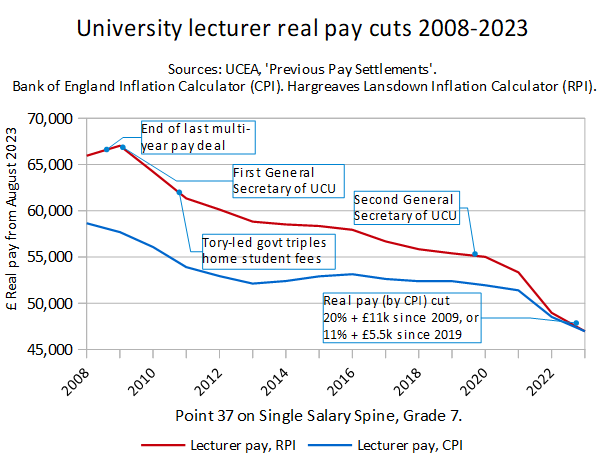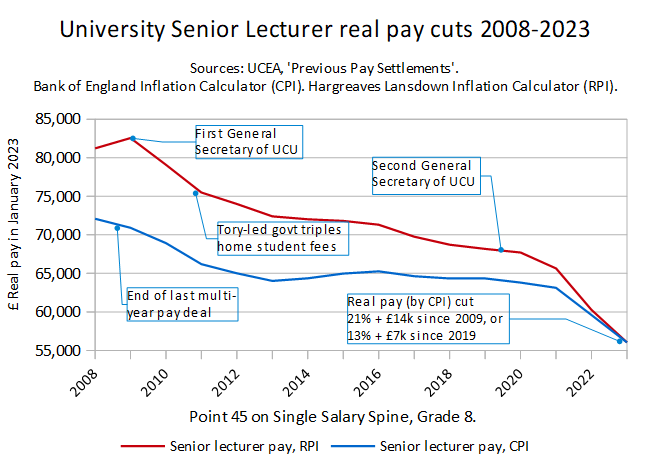1. Fair pay: pay back to real levels before 2010, not more waste on fancy buildings or management bureaucracy
The problems
Since 2019, pay has fallen off a cliff, down 13% in real terms (by the Consumer Price Index), and down over 21% since 2009, even though universities are sitting on piles of cash from tripled home student fees, and limitless international student fees. The money is being squandered on management bureaucracy and fancy buildings without caring about the people inside, and it has been poured into the vortex of escalating USS contributions, up from 20.35% of salary in 2009 to 31.4% today, even as failed USS directors were attempting to slash benefits. Worse, in some universities, colleagues have seen experience-based increments frozen, in clear breach of contract.
The solutions
If you vote, we will restore fair pay, and we will do it through common sense reason, collective action, legal action, and targeted publicity of wrongdoing. At KCL, we succeeded in getting the highest London Weighting in the capital, a 42% rise from £3500 to £5000 in 2 years. People need to want to work in UK universities, so we need to become internationally competitive again, particularly by raising salaries for early-career scholars. In Further Education, staff must be equal with teachers, not less, and all teachers’ pay must go up. We need to reduce inequality overall, and help restore the right to fair pay across the UK. We need a fair progression system for professional service staff. Where a small group of institutions are struggling financially, UCEA and UUK need to get their act together and discipline and delayer members with wasteful management, not attack front-line staff. If you join our platform, UCU will end wage theft, completely. As we restore pension rights, and transform USS for the long-term, every university must use the savings from reduced contributions to raise pay: that is our money, not theirs. Our universities can be so much better, and working together we will do it.
How we do it
Our strategy will be to get a multi-year deal, as we had before 2009, and win through:
- sector-wide bargaining, aggregated ballots, and simple system reform to never lose a ballot again,
- restoring sectoral bargaining in FE, with at least equal pay compared to teachers – that’s 20% up,
- leading by example at UCU itself: every penny of reduced USS employer contributions back to staff,
- lobbying the government to roll out sectoral bargaining for fair pay and restored labour freedom.
More reading on the right to fair pay, and sectoral collective bargaining
- Universal Declaration of Human Rights 1948 article 23
- E McGaughey, ‘All in ‘It’ Together: Worker Wages Without Worker Votes’ (2016) 27(1) King’s Law Journal 1
- H Collins, ‘Fat cats, production networks, and the right to fair pay’ (2022) 85(1) Modern Law Review 1-24
- I Katsaroumpas, ‘A right against extreme wage inequality: a social justice modernisation of international labour law?’ (2021) 32 King’s Law Journal 260-286
- E McGaughey, A Casebook on Labour Law (Hart 2019) ch 6 (wages, taxes, pensions) and 9-10 (collective bargaining and action)

